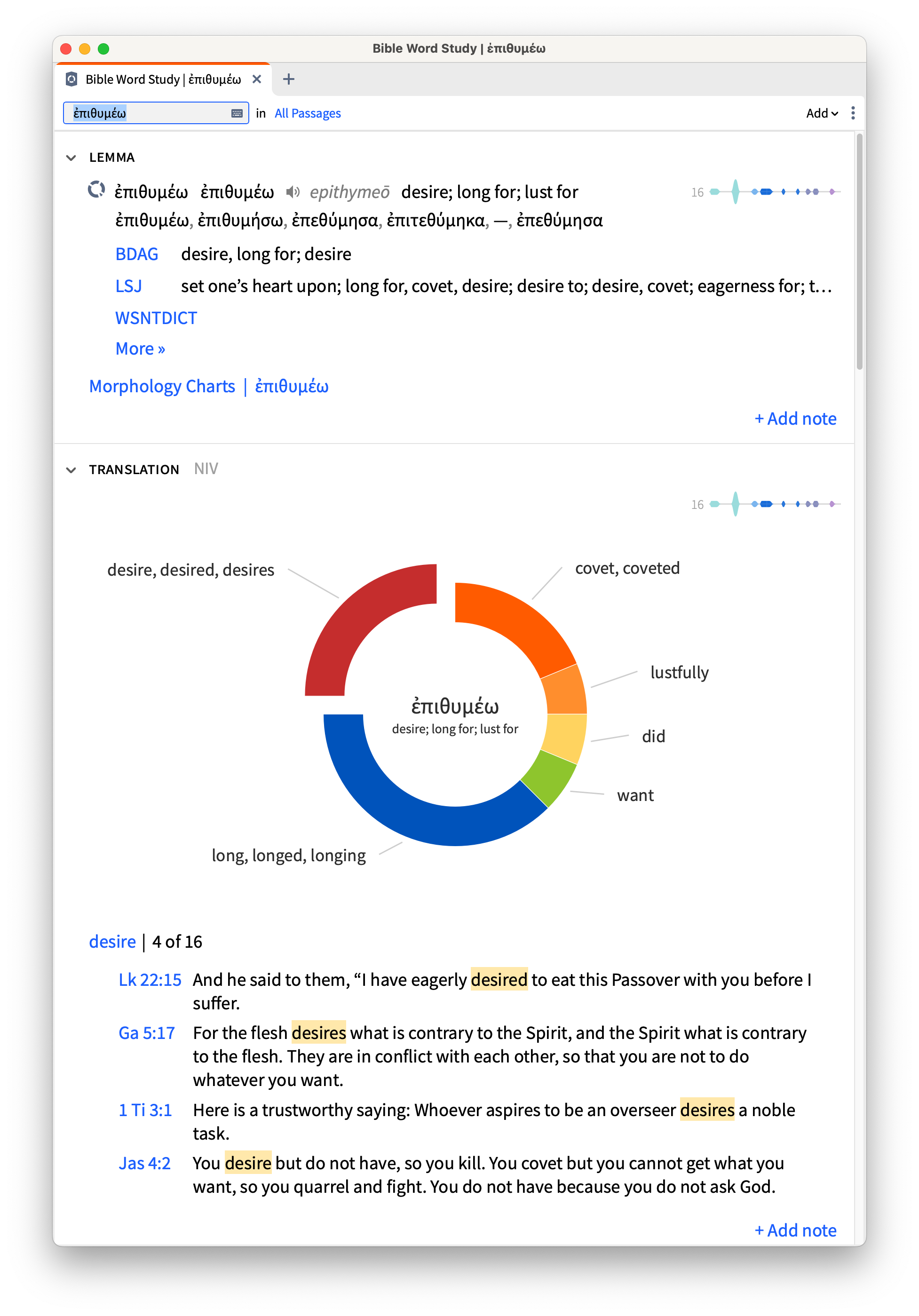When you saw that this article was going to be about lust, which Bible verses came to mind? My guess is that you started out with the command about adultery and then remembered Jesus’s words about “lusting” after women (and cutting off your hand). And while those passages and others like them are indeed important, they address a very small part of God’s words about lust. That’s because, although “lust” in modern parlance is usually thought of in terms of inappropriate sexual desire, scripturally the word means far more than that.
Yes, the Ten Commandments address adultery (Exod 20:14), but the primary command in that passage about lust is actually found in Exodus 20:3: “You shall have no other gods before me” (NIV).
Yes, Jesus’s most famous sermon talks about “looking lustfully at a woman”; but have you ever considered the connections to list in Jesus’s powerful words about your “righteousness” exceeding that of the Pharisees, and the destination of those who fail to fulfill the whole Law (Matt 5:20)?
Both Moses and Jesus bind commands about true worship, idolatry, and lust together.
Right about now you might be wondering what having other gods, what the Bible frequently calls “idolatry,” has to do with lust. Would you be surprised if I said, everything? Let’s take a look at the word “lust” in the original languages of the Bible, then draw some connections between it and what we worship. When that worship is disordered, it becomes what’s typically called “idolatry.”
The word commonly translated “lust” in the New Testament is epithymeo. Look it up with the Logos Bible Word Study (click here to do so), and you’ll see that the word means to “desire; long for; lust for.”

Right off the bat, you can see that epithymeo could be used to speak of more than just disordered sexual desires. In fact, surprisingly, it’s a word that Jesus used of himself in Luke 22:15 when he said, “I have fervently desired [epithymeo] to eat this Passover with you before I suffer.” Paul used it as well in Acts 20:33, “I have not coveted [epithymeo] anyone’s silver or gold or clothing.” In the Greek of the New Testament, you can see that epithymeo may be either positive (as in Jesus’s use of it) or negative (as in Paul’s declaration)—and so epithymeo might refer to a good and beneficial desire, or to a lust that is corrupting to the soul and harmful to others.

Sinful lust is idolatry
Who or what drives the focus of your mind, heart, life, energies? On what or whom do your affections rest? Who or what captivates your attention? Jesus was captivated by and focused upon deep communion with his disciples, and by extension with us. He profoundly desired union with his disciples, This is my body, broken for you; this is my blood shed for you (see Matt 26:26). He was driven by the desire to incarnate God’s love to us and oneness with us and that lust (if you’ll let me use the word that way) drove him all the way to the cross. Paul, too, was driven by the right kind of desire. He refused to allow the love of money to control or motivate him. He didn’t lust after riches. Instead, he worked hard to provide for his physical needs so that the spiritual needs of the Ephesians would be supplied (see Acts 20).
In addition, the apostle James uses epithymeo to describe an “evil desire” that draws, entices, and entraps one’s heart and leads away from the good and perfect gifts the Father gives (see Jas 1:14). Rather than being satisfied with the abundantly generous blessings bestowed through Christ, lust draws the heart away after lesser pleasures. Sure, some may be sexual in nature, but they don’t have to be. How many times have you spoken ungodly words because someone ate the last bagel—or got the promotion you assumed you’d get? James teaches that strong desires—“lusts”—lie at the bottom of all our sinful behaviors.
James also employs this word when diagnosing the source of our quarrels and conflicts: “You desire [epithymeo] and do not have. You murder and covet and cannot obtain” (Jas 4:3). In this case, this desire, whatever it may be, means more to you than worshiping and obeying the Lord or seeking peace with your neighbor. Lust, the desire to obtain the prized object, turns us from loving our neighbor to hating him—and even murdering him in our hearts. A desire has become your god. The lusted for, desired object is what you worship and serve.
As an aside, how can you judge whether a desire (even a beneficial one) has become too important to you? Ask yourself these questions:
- Am I willing to sin in order to obtain this?
- Am I willing to sin because I don’t have it?
- Am I willing to fight with others in order to get it?
If you suspect that your answer to any of these questions is yes, then you’re probably dealing with lust and idolatry. And the only way to conquer inappropriate desires is to replace them with stronger ones.
The power of the gospel
The only right way to replace disordered desires is to replace them with holy ones. That’s why it’s so important for us to seek to obey the command to love God with our whole heart, soul, mind, and strength (Matt 22:38–39). And while you may be nodding your head in agreement, that doesn’t mean that you have the consistent motivation to do it. Sure, I know that I need to love God and stop lusting after things that destroy my soul, but exactly how do I do that? The apostle John shows us the way, “We love because he first loved us” (1 John 4:19). The only power strong enough to free us from self-focused desires is the love God has showered us with in Christ:
All things are yours … the world or life or death or the present or the future—all are yours, and you are of Christ, and Christ is of God. (1 Cor 2:21–23)
Pause for a moment now and consider: What would your life be like if you really believed what Paul said there? If you really believed that you already had everything you needed, if you were so forgiven and so loved that you didn’t have to fight for your rights, for what you thought you needed? What would your life be like? How would it change?
In other words, it’s not enough for me to simply tell you that lust is more than sexual desire. Nor is it enough for you to know that lust is deep desire that ought to be focused on the Lord alone. My telling you to love God won’t make you do it. The only power that’s strong enough to motivate you to desire God above all things is the knowledge that you have been and will always be loved deeply. If you’ve come to him in faith, believing all that he has said about welcoming and loving you, then you’re completely forgiven, beloved, and even desired by him. Jesus desired to have a meal with his bride. He still does. And he will.
No matter what you are desiring or lusting after, if it has taken the place of preeminence in your heart, mind, and deeds, it has become your god. I’m not saying that strong desire is always wrong. Of course it isn’t. But it becomes sin when it is the thing you’ve set your ultimate affections on, if that thing is not Jesus.
Here are a few more diagnostic questions that might help:
- When your mind is not occupied by conscious thought, what do you muse on?
- When you imagine what a blessed life would look like, what does it look like?
- When you were growing up, what were you taught was the mark of a good life?
- When you feel sad, angry, discouraged, or self-indulgent, what are you longing for?
- What do you commonly complain about?
- What do you worry about?
Again, don’t assume that disordered desires, lust, or idolatry must be focused on obviously sinful things. In fact, for the Christian who knows that great riches won’t truly satisfy, the desire for “just a little bit more,” often takes its place and deceives us into thinking that these “little” lusts are of no consequence.
We have all we need
The good news that has been declared in the gospel is that because of his love, God has already given us everything we need for life and godliness in Christ (2 Pet 1:3). Because we’ve been so loved, we don’t have to spend our lives longing for more and more. And then, even on the days when we find that, once again, we’ve spent way too much time longing for that thing, we can rest in Christ’s forgiveness, welcome, and provision for us. We can pray,
Lord, thank you for loving me even when I turn away from you to other gods. Thank you for forgiving me and renewing my faith in you. Thank you also for allowing me to fall into this again, so that I can be thankful for you again. Help me to love only you.
A short word about lust and sexual desire
Because sexual desire is physical and driven by hormones, many people find it difficult to control or suppress. In addition, people, particularly men, have been taught that appreciating beauty is analogous to lust and therefore sinful. I disagree. If we stick to the definition of “lust” that we’ve been using, we see that one might appreciate something beautiful without allowing that appreciation to become self-centered and destructive. In the same way that I can look at a beautiful home and not covet it, why can’t we appreciate the beauty God has bestowed on one another without lust? Of course, self-knowledge will help each of us know what boundaries we should construct. But to assume that women should dress themselves in burkas in order to keep their brothers from lust is futile. Strong desire is part of what it means to be human. Learning what triggers coveting or sinful desires is what it means to grow in wisdom. And meditating on the beauty of what Jesus Christ has already given us will help us grow and will free us from insisting that others are responsible for our godliness.
Here’s some really good news: a day is coming when all of our desires will be purified and we won’t have to struggle with any idolatries or lusts. We will be purified because, as John writes, “We will see him as he is”—and we will be like him. Lord, please hasten that day!
Resources we recommend to learn more from Elyse Fitzpatrick
Mobile Ed: PD102 Idolatry and the Power of the Cross (2 hour course)
Regular price: $79.99

Overcoming Fear, Worry, and Anxiety: Becoming a Woman of Faith and Confidence (audio)
Regular price: $19.95






